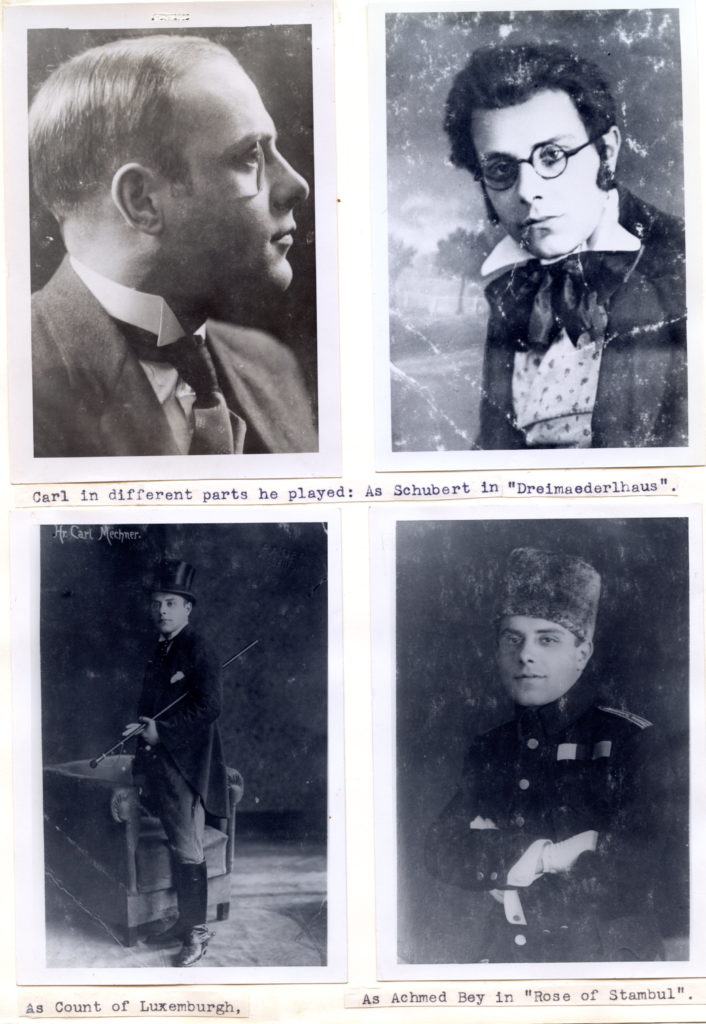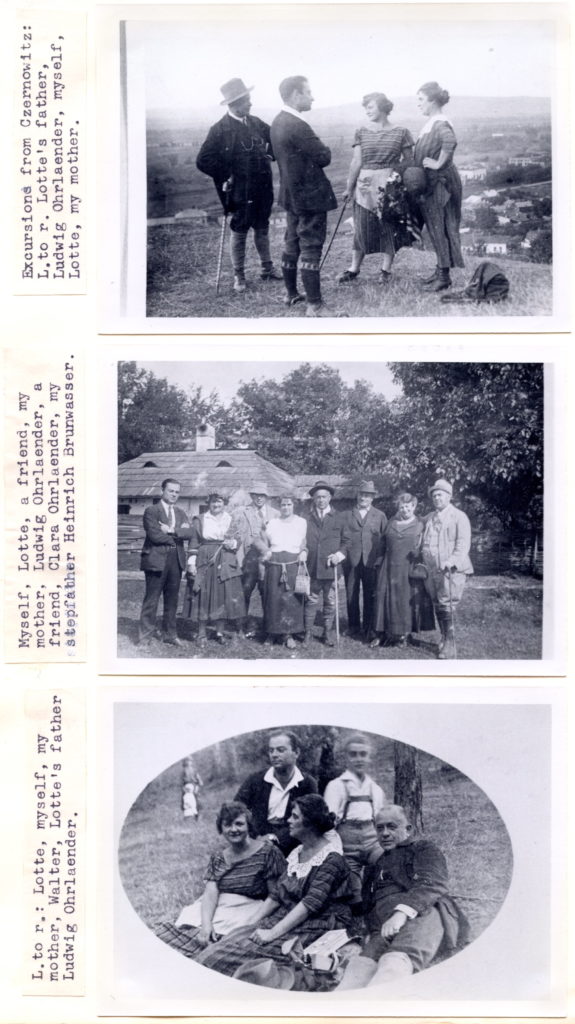1922
There was also Carl at home, whose engagement on the theatre in Czernowitz as operetta tenor for one season had just ended. It was, as it turned out later, his last function on a theatre for the rest of his life. At this point it is appropriate that I describe his theatre activities up to that time. I had written to Carl some time ago and had asked him to give me a complete description of his theatre activities, since I wanted to include these data in this biography. He sent me a list, which did not satisfy me, since I knew that it was incomplete. But he is now 82 years old, and he wrote that he cannot remember all the operettas, in which he has played.
Although it is an incomplete list, I will repeat here, what he wrote. I had mentioned already that he was from November 1st, 1918, till September 30th, 1919, on the theatre in Krems. He continued the list as follows: From October 1st, 1919, till September 1st, 1920, at the Stadttheater in Klagenfurt; from September 15th, 1920, till April 30th, 1921 at the Stadttheater in Aussig, from May 1st, 1921, till June 30th, 1921, as guest at the Stadttheater in Salzburg; from July 1st, 1921, till March 31st, 1922, at the Stadttheater in Czernowitz. In between he had engagements as guest for short periods in St. Poelten, Wiener Neustadt, Baden bei Wien, Villach, Karlsbad.
Then followed the list of the operettas and the parts, which he played, partially incomplete, where he did not remember the names and put a question mark. Johann Strauss’s Die Fledermaus (The bat) as Eisenstein; as Alfred, Zigeuner Baron (Gypsy baron); as Barinkay, Nacht in Venedig (Night in Venice); as count (?), Wiener Blut (Viennese blood); the tenor part; Milloecker’s Der Bettelstudent, as Simon; Gasparone as Gasparone; Franz Lehar’s Die lustige Witwe (The merry widow), as Danilo; Rastelbinder, the tenor part in Die geschiedene Frau (The divorced woman) as Carel; Zigeunerliebe (Gypsy love) as Jozsi; Puerstenkind (Count’s child), as Hadschi Stavros; Die blaue Mazur (The blue mazur), the tenor part; Der Graf von Luxemburg (The count of Luxemburg),the title role; Eva, Octave Flaubert, Kalman Czardasfuerstin (Czardas countess); Faschingfee (Carnival fairy); Hollandweibchen (Holland wife), the tenor part; Oskar Strauss’s Walzertraum (Dream waltz), as lieutenant Nicki; Rund um die Liebe (Around love),the tenor part; Leo Fall’s Die Dollarprinzessin (The dollar princess), as Fredy Warburg; Rose von Stambul (Rose of Stambuli, as Achmed Bey; Der fidele Bauer (The jolly peasant), as Stefan; Der liebe Augustin (Dear Augustin), the title role; Gilbert’s Die keusche Susanne (The chaste Susan), the tenor part; Liebe im Schnee (Love in the snow) in the role of Kammersaenger (royal singer); Jessel’s Schwarzwald Maedel (Girl from the Black Forest), the tenor part; Kollo’s Extrablaetter (Special papers), the tenor part; Berte’s Dreimaederlhaus (Three girls’ house), the part of Schubert; Zeller’s Der Vogelhaendler (The bird seller), the part of Adam and of Stanislaus; Das suesse Maedel (The sweet girl), the tenor part; Offenbach’s Orpheus in der Unterwelt (Orpheus in Hades), as Pluto; Die schoene Helena (The beautiful Helen), as Paris; Drei alte Schachteln (Three old maids), the tenor part; Dellinger’s Don Caesar (Don Caesar), the tenor part; Leo Ascher’s Hoheit tanzt Walzer (Highness dances waltz), the tenor part; Edmund Eisler’s Der lachende Ehemann (The laughing husband), as Graf Selztal; Gruenecke’s Der Boehm in Amerika (The Bohemian in America), the tenor part.
He also sang in a few operas, like in Weber’s Der Freischuetz, the part of Max; in Leoncavallo’s Il Pagliacci, the part of Silvio; in Die toten Augen (The dead eyes), the part of count Alba; and in Wagner’s Der fliegende Hollaender (The flying Dutchman), the part of the Steuermann.
The list is incomplete. There were many more operettas, in which he sang. But it is not important to mention all of them. He always played the tenor part, which was often the title-role. He had a beautiful voice and was a very good actor, was elegant where necessary, like in the “Count of Luxemburg”, and also a very good dancer. And, what is also important, he was very handsome, adored by many of the young female audience. Unnecessary to say that he was very musical, played the violin quite well and also the piano. I had visited him once in Krems in 1919, and saw him in the operetta “Der fidele Bauer” (The jolly peasant), in which he played the part of Stefan, the son of the jolly peasant.
As I said before, when I came for my vacation to Czernowitz, Carl was there, and the theatre season and his participation in the ensemble had just ended. Shortly before I came, he had met a girl and had fallen in love with her. Her name was Lotte Ohrlaender, and she was the only daughter of Oberlandesgerichtrat, (which means judge of a higher court) Ludwig Ohrlaender and his wife Clara. It so happened, that she had fallen sick with typhoid fever that summer and I therefore could not meet her. That was a very serious disease in those days, lasting six weeks and leaving the patient in a very weak state afterwards. Nevertheless, Carl visited her every day and sat for many hours near her bed. In spite of my warning, he insisted on going there every day, but I instructed him to be careful and not to have any contact with her, also not to eat nor drink there anything. Her father and mother were very careful anyway, boiled everything, and so all ended well. After I left for Vienna, the two families got together and made arrangements for a wedding. They were so-called well-to-do people and gave their daughter a good amount of money as dowry, so that Carl could become a partner in the business of my stepfather. It was a very good arrangement. After the wedding which took place on March 4th, 1923, Carl moved into the house of Lotte’s parents.

